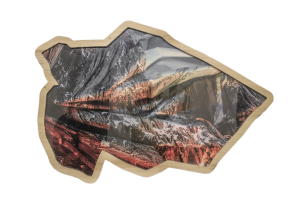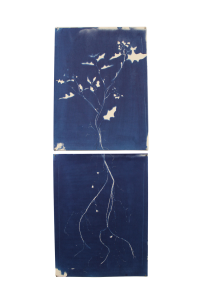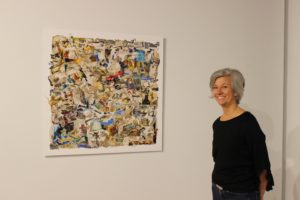All Photos By Gregory Binu | Mercury Staff
The “Grounded: Art Exhibition” at the SP/N Gallery at UTD, curated by Marilyn Waligore, professor of photography at UTD’s Bass School, captures the urgency of humans’ fragile relationship with the environment.
“Grounded” offers a compelling reflection on our environment through the lens of photography and video. The exhibition is open from Oct. 13 to Nov. 18, 2023 and aims create a conversation about humans’ impact on the planet and the need for sustainable practices. As visitors explore the gallery, they encounter a diverse array of works all centered on the themes of “grounded,” shining a spotlight on the interconnections between people and the planet and inviting viewers to contemplate the current state of our environment.
The exhibition includes work from Becky Wilkes, an artist from Azle, Texas on Eagle Mountain Lake, whose thought-provoking piece titled “A Bad Wrap” demands attention. Wilkes ingeniously transforms discarded wrappers into art, compelling the viewers to confront the environmental impact of our consumption habits. Her work encourages viewers to reflect upon the consequences of their actions and find ways to reduce waste and protect the planet.
“It’s a gorgeous exhibition, and I’m just tickled that Marilyn selected my works to hang in here,” Wilkes said.
“A Bad Wrap” is an artwork made from 215 wrappers collected from a mile of lakefront. This archival pigment print, measuring 40 by 40 inches, serves as an unsettling reminder of the pollution plaguing our natural landscapes.
“Basically, any kind of wrapper that I came across, I started photographing … Each wrapper, to me, is a fingerprint of a choice that was made … [whether] accidental or intentional,” Wilkes said. “It’s all trash, and it’s a decision that shouldn’t have happened.”
Wilke’s artwork focuses specifically on the environmental issues surrounding Eagle Mountain Lake, which receives runoff from a watershed spanning over 800 square miles despite the lake itself covering only 14 square miles. The influx of water during rainstorms carries debris from streets, ditches and storm sewers to the lake’s shore. Wilkes’s artwork explores the flood of pollution runoff and need for public awareness and action.
“When it rains, it’s like a great big toilet has flushed … That’s why the project is called ‘Ditched’,” Wilkes said.
Another remarkable artist featured in the exhibition is Elizabeth Mellott, a professor of photography and service-learning coordinator at Collin College in Plano, Texas. Her artwork captures the delicate balance between nature and human intervention, evoking a sense of urgency to protect and safeguard our ecosystems. Mellott’s artwork stems from her personal experiences, mainly as a beekeeper, and from her exploration of the environment.
“I didn’t know anything about native plants or pollinator plants or beneficial plants, so it led me down this path of learning about the environment,” Mellott said.
For the exhibition, Waligore selected two highly poisonous plants from Mellott’s submission, one of them being “Hemlock, Conium maculatum.” Mellot said that Waligore focused on how people take advantage of the Earth in order to make them think about it.
“When a plant’s poisonous, we have no choice, we must respect that plant because it has greater power than us,” Mellott said. “I didn’t think about that … the tables kind of turned.”
In “Hemlock, Conium maculatum” and “Deadly Nightshade, Atropa belladonna,” Mellot explores the tall stature of hemlock and the small size and poisonous roots of deadly nightshade. She juxtaposes images of created spaces, drawing attention to the contradiction in how humans treat the Earth and prompting viewers to reflect on what they accept and reject in terms of environmental impact.
“I’m just hoping that people think about it a little more than what I used to … I just took what was fed to me … I hope it makes them just think a little,” Mellott said.
Both Wilkes’s and Mellot’s works contribute to the exhibition by providing a platform to engage in environmental issues and encourage viewers to reflect on their own personal responsibility in shaping a sustainable future. By showcasing the power of art as a catalyst for change, the exhibition inspires and advocates for environmental awareness and action.
“It was a curated show, so every piece was a conversation with the other pieces,” Mellott said.
By bringing together talented artists like Becky Wilkes and Elizabeth Mellot, the exhibition not only enriches the cultural landscape but also encourages a multidisciplinary approach to addressing environmental concerns. “Grounded: Art Exhibition” at UTD’s SP/N Gallery is a must-see event that promises to ignite dialogue, spark introspection and inspire action. By exploring the artworks at Grounded, visitors will understand the urgent need for environmental preservation and the uncertain future that faces our world.









